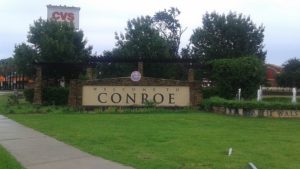Isaac Conroe
 CAPTAIN ISAAC CONROE, whose death ended the career of one of Southeast Texas’ most enterprising lumbermen and public-spirited residents in 1897 at the age of sixty-two, was the builder of the city which bears his name and which is now the county capital of Montgomery. He was the first postmaster in this position and retained his office for several years until his death he was an involved business leader and civic leader. ttarchive.com- Conroe-Isaac
CAPTAIN ISAAC CONROE, whose death ended the career of one of Southeast Texas’ most enterprising lumbermen and public-spirited residents in 1897 at the age of sixty-two, was the builder of the city which bears his name and which is now the county capital of Montgomery. He was the first postmaster in this position and retained his office for several years until his death he was an involved business leader and civic leader. ttarchive.com- Conroe-Isaac
Gertie Spencer, a historian of Montgomery County, believes that Capt. Isaac Conroe must have been such a charismatic man. In order to arrive in the south as a Union captain, win over Houstonians and establish himself in the time of Reconstruction as a wealthy businessman, he would have had to be.
Conroe was reported as one of Southeast Texas’ most enterprising lumbermen and public-spirited citizens” in a passage published in the 1910 edition of the “Historical Review of South-East Texas.” Still, as the builder of the town that serves as Montgomery County’s county seat, his name lives on.
Life at an early age
In 1835, in Long Branch, New Jersey, Isaac Conroe was born.
He was with the Chicago postal service at the start of the Civil War and he enrolled and became part of the 12th Illinois Cavalry there. He served with distinction and was elevated to captain’s rank.
He assembled in Houston at the end of his operation. In Washington, D.C., he married Miss Margaret Richardson and then moved to Houston, settling in Harris City, on Cedar Bayou.
He became interested in the Lynchburg-Houston timber and freight company. From Judge Munger’s lumber yard in Houston came one of his first forays into lumber and sawmills. Judge Munger’s checker was missing that day, so Capt. Conroe performed the duty of inspecting the lumber himself. Judge Munger was so impressed with the work of Conroe that he gave him a job as a checker, which Conroe took. Conroe made himself acquainted with all facets of the business.
Establishment of a City
On the I & GN Railroad and another at Haltom, both in Montgomery County, Conroe worked mills in Egypt in the early 1870s. At the site that would become Conroe, he later built a mill.
Capt. Conroe, as his mill became known as Conroe’s Turn, would ride the railroad up from Houston and his stop. The name was eventually abbreviated to Conroe, and railroad official H. M. Hoxey recommended that the town’s first people call it after Conroe.
Until the time of his death, Conroe was synonymous with timber and sawmills. “Although he was a Republican and held only the postmaster’s office, according to the passage in “Historical Analysis of South-East Texas,” he was one of the city’s most progressive and public-spirited citizens.” It goes on to state, “His personality was one of winning friends and keeping them through life.”
He set up a house on Avenue A and First Street in Conroe, and today a historical marker denotes the location of the land in history. In the late 1800s, after the county seat was transferred to Conroe, his home remained at Conroe’s house on Avenue A for a temporary period, until a courthouse was completed in Conroe in 1891.
Conroe was also the first postmaster of the area, a position founded this week in 1883. Before his death at age 62, on Aug. 2, 1897, after suffering a heart attack, Capt. Conroe resumed his work in the mills and duty to the city. In Glenwood Cemetery in Houston, Capt. Conroe is buried, with Masonic acknowledgment marking his tomb.
Passing the Spirit of Culture Forward
Conroe had three daughters, Rowena, Effie, and William Munger Conroe, with his son.
An integral part of the town of Conroe also became William Munger Conroe. He was born in Houston on Oct. 30, 1870, and he became his father’s heir in much of his affairs. William Munger Conroe started working at his father’s mill at an early age.
He went off to New York business school and came back to help manage his father’s mills. William Munger Conroe was appointed trustee of his father’s estate when the elder Conroe died in 1897 and later organized the Conroe Lumber Company.
William Munger Conroe also served as a postmaster and much like his father was an influential member of the Masonic Lodge. In 1898, Hattie E. Urquhart married William Munger Conroe and they had two daughters, Elbert Isaac and Lois Louise Conroe. He died on Jan. 16, 1947, and is buried in Conroe’s Oakwood Cemetery.
Isaac Conroe’s house
In recent years, over a period of 10 months, Carl and Lyn Howard renovated the 1885 Conroe home.
A Founder’s Day on Aug. 2, 2018, took place to mark the completion of the plant, where the Howards arranged a ceremony with members of the Conroe family. They opened up the home for touring as well.
The Howards were shocked at the solid design of the house. “I don’t know of any house being built today that could be in such a shape 130 years from now,” Lyn Howard said. “The bones are so solid and so well-built. They built them to last, and that’s for sure. Over the summer, the town of Conroe bought the building. yourconroenews.com- Isaac-Conroe
